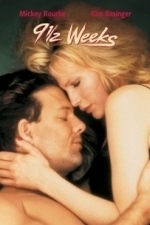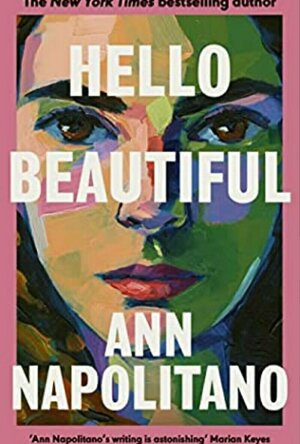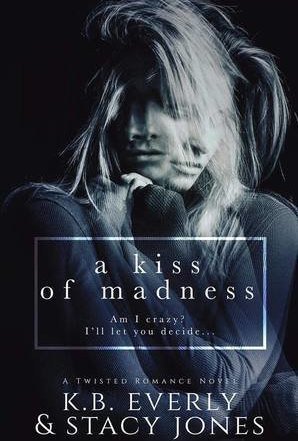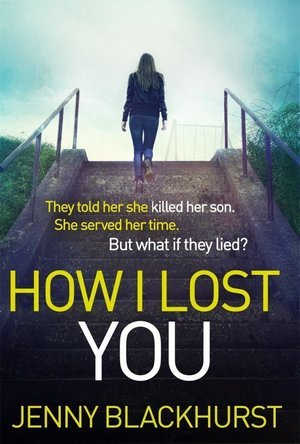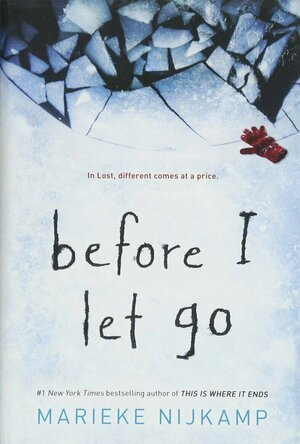Search
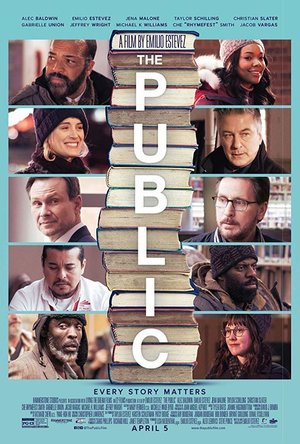
The Public (2019)
Movie Watch
In "the public" an unusually bitter Arctic blast has made its way to downtown Cincinnati and the...
LoganCrews (2861 KP) rated 9 1/2 Weeks (1986) in Movies
Sep 3, 2021
Wild, magnetic, and hot as hell - nobody does these like Lyne, man. One of the things I love most about this is that it's one of the sacred few of these that don't demonize kink *nor* make it a symptom of some trauma/mental illness; this is simply two consenting adults participating in a kinky relationship. They were getting this shit right in 1986, people - there's no excuse to keep messing it up 35 years later. Of course Rourke and Basinger have smoldering chemistry here too, their performances are so daring for the time and hold up airtight even today. Asks the devastating question of whether it's worse when passion is lost altogether, or when it becomes too consuming for one's reasonable expectations to handle? Also features a montage of the two leads fucking on a rainy alley staircase to loud 1980s synth music after beating up a random group of thugs - so you really get the best of both worlds. The last 20/25 minutes is the best work of Lyne's entire career. 80s MTV version of 𝘍𝘪𝘧𝘵𝘺 𝘚𝘩𝘢𝘥𝘦𝘴 𝘰𝘧 𝘎𝘳𝘦𝘺 (still not quite as good as 𝘚𝘦𝘤𝘳𝘦𝘵𝘢𝘳𝘺, though).
ClareR (6079 KP) rated Hello Beautiful in Books
May 9, 2023
Between finishing reading Hello Beautiful and writing this review, this book has exploded. Oprah has taken it under her wing and shown it as the wonderful piece of work that it is to her followers. So, it has already been read by a lot of people - and rightly so. I loved it. Books about families and family relationships, whether they’re a difficult or loving relationship, are one of my most favourite things.
There are most certainly echoes of Little Women, but if you’ve never read it, it won’t make much difference to your enjoyment. You might want to try Little Women at some point though!
William Waters grows up in a very dysfunctional family, and is drawn into the Padavano family when he marries Julia - it’s a family he comes to love.
With themes of mental illness, family loyalties, love in all of its forms and loss, it’s a big read for only around 400 pages. The story just sped by, and I was bereft when I turned the last page.
I loved the world of William Waters and the Padavano sisters.
Highly recommended.
There are most certainly echoes of Little Women, but if you’ve never read it, it won’t make much difference to your enjoyment. You might want to try Little Women at some point though!
William Waters grows up in a very dysfunctional family, and is drawn into the Padavano family when he marries Julia - it’s a family he comes to love.
With themes of mental illness, family loyalties, love in all of its forms and loss, it’s a big read for only around 400 pages. The story just sped by, and I was bereft when I turned the last page.
I loved the world of William Waters and the Padavano sisters.
Highly recommended.
Heather Cranmer (2721 KP) rated A Kiss of Madness in Books
Jan 14, 2019
Too much smut (3 more)
Unbelievable plot
Underdeveloped and unlikable characters
Book is confused about the plot
Reads More Like a Rough Draft
I love reading books about mental illness, and even more so if they take place inside an asylum. When I saw A Kiss of Madness by K.B. Everly and Stacy Jones, it seemed like the perfect read for me. Unfortunately, I was left very disappointed.
The synopsis for A Kiss of Madness sounded very interesting. It could have been a very interesting book except there's too much going on in the story. Lydia gets sent to Brocker's Center for the Criminally Insane after having a vision and throwing a chair through a window as well as attacking an innocent bystander. She could have chose jail time or to voluntarily commit herself to Brocker's. She chose the latter. While there, she gets feelings about people and doesn't feel like she belongs. She meets three guys who are patients with their own issues. However, she ends up thinking they're hot, and they also think she's hot. The guys all agree to be her boyfriends and end up following her everywhere. When one of the other female patients goes missing, Lydia tries to uncover what really happened putting herself in grave danger. I was confused if A Kiss of Madness was trying to be more of a romance novel, a mystery/crime novel, or a paranormal novel. I got the insane asylum vibe for a few chapters, but soon this book lost its whole mental illness vibe. I felt like the insane asylum setting was just thrown in there to make this book sound more interesting than it actually was. It soon turned more into an erotic novel which made me like the book even less. There was just too much pointless fairly graphic sex for my liking. I feel like all the fairly graphic sex and sexual references really took away from the story. I also didn't like the ending. It just felt too rushed. Actually, the whole story just felt really rushed. I also didn't understand how one character who had a violent past could have such a great job. I won't go into further details because it's a spoiler.
I started out liking Lydia and was on her side for the first few chapters or so. However, I found myself losing the connection I felt with her the more I read. She just came across as being very irresponsible and immature. I didn't really care for Pierce, Emmett, or Mason/Jason either. None of the characters in A Kiss of Madness were fleshed out enough to be likable or believable.
The pacing starts out great in A Kiss of Madness. However, it soon slows down once the sex scenes come into play. Then it slows down and becomes more of a smut novel instead of a decent read. Luckily this is a short read or I would have given up on it when I got to the sex parts.
Trigger warnings for A Kiss of Madness include violence, murder, mental illness, attempted sexual assault, fairly graphic sex scenes, sexual references, and profanities.
Overall, A Kiss of Madness started out great. However, it soon went downhill close to halfway through the book. I feel like this book feels more like a rough draft on what could be a decent read. It just needs a lot more work to be good. Get rid of a lot of the pointless sex scenes and references, bulk up the story and characters a bit, decide on what angle to go with, and give this book some guts! At this time, I would not recommend A Kiss of Madness by K.B. Everly and Stacy Jones.
The synopsis for A Kiss of Madness sounded very interesting. It could have been a very interesting book except there's too much going on in the story. Lydia gets sent to Brocker's Center for the Criminally Insane after having a vision and throwing a chair through a window as well as attacking an innocent bystander. She could have chose jail time or to voluntarily commit herself to Brocker's. She chose the latter. While there, she gets feelings about people and doesn't feel like she belongs. She meets three guys who are patients with their own issues. However, she ends up thinking they're hot, and they also think she's hot. The guys all agree to be her boyfriends and end up following her everywhere. When one of the other female patients goes missing, Lydia tries to uncover what really happened putting herself in grave danger. I was confused if A Kiss of Madness was trying to be more of a romance novel, a mystery/crime novel, or a paranormal novel. I got the insane asylum vibe for a few chapters, but soon this book lost its whole mental illness vibe. I felt like the insane asylum setting was just thrown in there to make this book sound more interesting than it actually was. It soon turned more into an erotic novel which made me like the book even less. There was just too much pointless fairly graphic sex for my liking. I feel like all the fairly graphic sex and sexual references really took away from the story. I also didn't like the ending. It just felt too rushed. Actually, the whole story just felt really rushed. I also didn't understand how one character who had a violent past could have such a great job. I won't go into further details because it's a spoiler.
I started out liking Lydia and was on her side for the first few chapters or so. However, I found myself losing the connection I felt with her the more I read. She just came across as being very irresponsible and immature. I didn't really care for Pierce, Emmett, or Mason/Jason either. None of the characters in A Kiss of Madness were fleshed out enough to be likable or believable.
The pacing starts out great in A Kiss of Madness. However, it soon slows down once the sex scenes come into play. Then it slows down and becomes more of a smut novel instead of a decent read. Luckily this is a short read or I would have given up on it when I got to the sex parts.
Trigger warnings for A Kiss of Madness include violence, murder, mental illness, attempted sexual assault, fairly graphic sex scenes, sexual references, and profanities.
Overall, A Kiss of Madness started out great. However, it soon went downhill close to halfway through the book. I feel like this book feels more like a rough draft on what could be a decent read. It just needs a lot more work to be good. Get rid of a lot of the pointless sex scenes and references, bulk up the story and characters a bit, decide on what angle to go with, and give this book some guts! At this time, I would not recommend A Kiss of Madness by K.B. Everly and Stacy Jones.
Acanthea Grimscythe (300 KP) rated How I Lost You in Books
May 16, 2018
As seen on <a href="http://theghastlygrimoire.com/"; target="_new">The Ghastly Grimoire.</a>
How I Lost You by Jenny Blackhurst is difficult for me to score with ease, to be completely and totally honest. There are several things I loved about this book and others that felt more like a cliche. Aside from those few moments, I enjoyed reading this novel.
Susan Webster, a.k.a. Emma Cartwright, finds her head still spinning after serving her time in a psychiatric prison for the murder of her son. As a character, she is for the most part fairly well-written. Having suffered a psychotic break, she becomes an unreliable narrator and Blackhurst does an excellent job at describing the sort of incredulity that individuals suffering mental illness find themselves often faced with. Reading Susan’s point of view felt very much like my own after a break I had about two years ago, and for that reason I found her to be relatable – all the way down to the seemingly instant attraction to an otherwise unknown man.
In some reviews, Susan’s interest in Nick has been viewed critically. I, on the other hand, have been that desperate for someone, anyone, to possibly listen to me or give me time of day so I feel Blackhurst’s portrayal of Susan in such a circumstance is certainly realistic. Diminished capacity for judgment is a side effect of mental illness, one that often gets dismissed as a cry for attention.
The story unfolds fairly quickly and in ways that are, at some moments, unsettling. Many of these moments take place in the past, where flashbacks take us to the glorious lives of the Durham Elite. It is in these flashbacks that I encountered the one cliche that absolutely annoyed the piss out of me: a cult like gathering that seemed to come out of nowhere. Seriously, cults are beyond overdone.
I really found myself dancing between three and four for this piece, largely because of the typical use of the “cult” as a scapegoat. For the most part, this is the only bit that appeared to stand completely out of place, so I’ve decided to lean toward four. Thus far, I find Emily Bestler’s selections to be wonderfully appropriate to my tastes and I look forward to seeing more of her publications as an imprint of Atria and Simon & Schuster.
I would like to thank the publisher and NetGalley for providing me with a copy of this book for the purpose of review. This review is written without bias and reflects my honest opinion.
How I Lost You by Jenny Blackhurst is difficult for me to score with ease, to be completely and totally honest. There are several things I loved about this book and others that felt more like a cliche. Aside from those few moments, I enjoyed reading this novel.
Susan Webster, a.k.a. Emma Cartwright, finds her head still spinning after serving her time in a psychiatric prison for the murder of her son. As a character, she is for the most part fairly well-written. Having suffered a psychotic break, she becomes an unreliable narrator and Blackhurst does an excellent job at describing the sort of incredulity that individuals suffering mental illness find themselves often faced with. Reading Susan’s point of view felt very much like my own after a break I had about two years ago, and for that reason I found her to be relatable – all the way down to the seemingly instant attraction to an otherwise unknown man.
In some reviews, Susan’s interest in Nick has been viewed critically. I, on the other hand, have been that desperate for someone, anyone, to possibly listen to me or give me time of day so I feel Blackhurst’s portrayal of Susan in such a circumstance is certainly realistic. Diminished capacity for judgment is a side effect of mental illness, one that often gets dismissed as a cry for attention.
The story unfolds fairly quickly and in ways that are, at some moments, unsettling. Many of these moments take place in the past, where flashbacks take us to the glorious lives of the Durham Elite. It is in these flashbacks that I encountered the one cliche that absolutely annoyed the piss out of me: a cult like gathering that seemed to come out of nowhere. Seriously, cults are beyond overdone.
I really found myself dancing between three and four for this piece, largely because of the typical use of the “cult” as a scapegoat. For the most part, this is the only bit that appeared to stand completely out of place, so I’ve decided to lean toward four. Thus far, I find Emily Bestler’s selections to be wonderfully appropriate to my tastes and I look forward to seeing more of her publications as an imprint of Atria and Simon & Schuster.
I would like to thank the publisher and NetGalley for providing me with a copy of this book for the purpose of review. This review is written without bias and reflects my honest opinion.
Jayme (18 KP) rated Turtles All The Way Down in Books
Apr 15, 2018 (Updated Apr 15, 2018)
Characters (3 more)
Plot
Accurate depiciton of mental illness
Didn't have an "easy" or cliche "fairytale" ending
I’ve been meaning to pick up a John Green book for a very long time, but it wasn’t until I heard good reviews of this book that I finally did. My initial thought after finishing the book is this: I now understand all the hype.
I read a great deal of YA fiction, but it is not very often that I finish the book feeling whole. Not because the ending was that of a fairy tale — John Green has a reputation for ensuring those endings don’t exist in his novels — but because the book was just so well-written. I feel as if many YA writers sit down to write books, but forget who their audience is. They are writing a much more washed out and juvenile version of what teenagers are actually like today. They are afraid to let their characters cuss or talk about sex, as if neither action actually exists among young adults. YA authors tend to stray away from the reality of teen behavior, but this book faced realities in a compelling way.
The novel follows Aza, a sixteen year old with an obsessive compulsive disorder, as she navigates the implications of her illness on her relationships with other people. Simultaneously, Aza and her best friend Daisy make it their mission to find Davis Pickett’s billionaire father wanted by the police, and it just so happens that Davis is an old friend of Aza’s from camp.
I appreciated the way the Aza, Daisy, and Davis (as well as the other secondary characters) were facing so many different conflicts (i.e. grief, financial classes, love, mental health, college decisions) at once, because that is exactly how the world works. Real teenagers do not fixate their lives on one specific conflict for extended periods of time, rather they balance several conflicts. I love the way this book was able to depict that struggle to maintain a balance in such a way that allowed readers to follow each plot line to the very end.
I loved the characterization, as they all felt tangible. Their mannerisms and tendancies were displayed through each appearance on the page. There was not a single moment in any interaction that made me feel as if the personalities of these characters were lost, not even in the dialogue (which was also incredible). This attention to detail is something that will drive me to pick up another John Green novel in the near future.
I read a great deal of YA fiction, but it is not very often that I finish the book feeling whole. Not because the ending was that of a fairy tale — John Green has a reputation for ensuring those endings don’t exist in his novels — but because the book was just so well-written. I feel as if many YA writers sit down to write books, but forget who their audience is. They are writing a much more washed out and juvenile version of what teenagers are actually like today. They are afraid to let their characters cuss or talk about sex, as if neither action actually exists among young adults. YA authors tend to stray away from the reality of teen behavior, but this book faced realities in a compelling way.
The novel follows Aza, a sixteen year old with an obsessive compulsive disorder, as she navigates the implications of her illness on her relationships with other people. Simultaneously, Aza and her best friend Daisy make it their mission to find Davis Pickett’s billionaire father wanted by the police, and it just so happens that Davis is an old friend of Aza’s from camp.
I appreciated the way the Aza, Daisy, and Davis (as well as the other secondary characters) were facing so many different conflicts (i.e. grief, financial classes, love, mental health, college decisions) at once, because that is exactly how the world works. Real teenagers do not fixate their lives on one specific conflict for extended periods of time, rather they balance several conflicts. I love the way this book was able to depict that struggle to maintain a balance in such a way that allowed readers to follow each plot line to the very end.
I loved the characterization, as they all felt tangible. Their mannerisms and tendancies were displayed through each appearance on the page. There was not a single moment in any interaction that made me feel as if the personalities of these characters were lost, not even in the dialogue (which was also incredible). This attention to detail is something that will drive me to pick up another John Green novel in the near future.
Kristy H (1252 KP) rated Before I Let Go in Books
Jan 5, 2018
Easy to read (1 more)
Honest portrayal of mental illness
Lacks full character development (1 more)
Difficult to discern full point
Quick read that falls a little short
When Corey gets the call that her best friend, Kyra, has passed away--falling under the ice in their frigid hometown of Lost Creek, Alaska--she is devastated. Corey has been gone from Lost, as it's known, away at boarding school, corresponding with Kyra only via letters. She was due to visit in a few days and now her best friend is gone. Lost always shunned Kyra because she was bipolar and had maniac episodes. The small, insulated town couldn't understand Kyra's highs and lows. She stood out too much in a place where being different was wrong. But the seven months that Corey's been away has been long enough for the town of Lost to turn on her and now deem her an outsider. Since Corey's departure, Lost has suddenly embraced Kyra, though Corey isn't sure why. Even worse, they are calling Kyra's death meant to be, her time. They've rallied around in her death and they want nothing to do with Corey. Kyra always said she would wait for Corey to return: why didn't she?
I definitely have some mixed feelings about this one. It's billed as a YA mystery, and I can see its drama appealing more to teens, perhaps, but I could never really fully tell what the book was truly about or what it was trying to be. It has weird unexplained mystical elements thrown in--think Carol Goodman or Jennifer McMahon, but they aren't fully fleshed out or well-explained. I believe the intent is to slowly build up suspense and creep you out, but they don't slowly build up (they sort of start out full force and stay there, or almost trickle away... it's hard to explain) and they never really seem to have a purpose. So it's just one element of the book that leaves you hanging. The ending, too, leaves you with little closure.
The novel is told mainly from Corey's perspective, but we also get weird snippets told as if in a play format (like we're hearing from the town), but those aren't fully formed either. It's very strange. I liked Corey, but she comes in angry at her town and we don't get a lot of explanation into her character or real background into her friendship with Kyra, despite being assured that they were best friends up until Corey left.
It's sad, because I was really drawn to the character of Kyra (you get flashbacks to the girls' friendship and life before Kyra's death). I thought the book did a fairly good job of portraying mental illness and honestly Kyra--despite her death--seemed to be the most fully formed character in many ways. She implores Corey not to fix her, that she's not a puzzle to solve, and she discusses her manic spells in a very mature and very thoughtful way. It's one of the reasons that I'm keeping a three-star rating for this one; I'm hoping the portrayal of her illness can help and inform others.
There are also a variety of relationships portrayed in the novel--albeit, I thought, rather superficially--lesbian, pansexual, asexual, gay, etc. I wouldn't say any relationship is at all fully delved into, but I appreciate that Nijkamp at least wanted to try to be representative with her characters.
The other thing is that Nijkamp's books are just so darn easy to read. I remember that about This Is Where It Ends, too. I read almost this entire novel in one setting. Her writing draws you in so easily, even if you don't always agree with what you're reading, or if you wish for more character development. You could pick this up and fly through it in a day.
In the end, this certainly wasn't what I expected. The strange mystical elements seemed out of place and they, along with most of the characters, weren't really fleshed out. I was a fan of how easy the story was to read and the mental illness portrayal, though, as well as how easy the story was to read. I was drawn to the character of Kyra and wished I could have learned even more about her. The story was compelling and Nijkamp did an excellent job making you feel the cold of the Alaskan setting and the similar coldness of the townspeople. At the same time, while I could certainly see a small town being incredibly close-minded (and they were), some of the other plot points seemed a little overboard. A quick read, especially for teens.
I definitely have some mixed feelings about this one. It's billed as a YA mystery, and I can see its drama appealing more to teens, perhaps, but I could never really fully tell what the book was truly about or what it was trying to be. It has weird unexplained mystical elements thrown in--think Carol Goodman or Jennifer McMahon, but they aren't fully fleshed out or well-explained. I believe the intent is to slowly build up suspense and creep you out, but they don't slowly build up (they sort of start out full force and stay there, or almost trickle away... it's hard to explain) and they never really seem to have a purpose. So it's just one element of the book that leaves you hanging. The ending, too, leaves you with little closure.
The novel is told mainly from Corey's perspective, but we also get weird snippets told as if in a play format (like we're hearing from the town), but those aren't fully formed either. It's very strange. I liked Corey, but she comes in angry at her town and we don't get a lot of explanation into her character or real background into her friendship with Kyra, despite being assured that they were best friends up until Corey left.
It's sad, because I was really drawn to the character of Kyra (you get flashbacks to the girls' friendship and life before Kyra's death). I thought the book did a fairly good job of portraying mental illness and honestly Kyra--despite her death--seemed to be the most fully formed character in many ways. She implores Corey not to fix her, that she's not a puzzle to solve, and she discusses her manic spells in a very mature and very thoughtful way. It's one of the reasons that I'm keeping a three-star rating for this one; I'm hoping the portrayal of her illness can help and inform others.
There are also a variety of relationships portrayed in the novel--albeit, I thought, rather superficially--lesbian, pansexual, asexual, gay, etc. I wouldn't say any relationship is at all fully delved into, but I appreciate that Nijkamp at least wanted to try to be representative with her characters.
The other thing is that Nijkamp's books are just so darn easy to read. I remember that about This Is Where It Ends, too. I read almost this entire novel in one setting. Her writing draws you in so easily, even if you don't always agree with what you're reading, or if you wish for more character development. You could pick this up and fly through it in a day.
In the end, this certainly wasn't what I expected. The strange mystical elements seemed out of place and they, along with most of the characters, weren't really fleshed out. I was a fan of how easy the story was to read and the mental illness portrayal, though, as well as how easy the story was to read. I was drawn to the character of Kyra and wished I could have learned even more about her. The story was compelling and Nijkamp did an excellent job making you feel the cold of the Alaskan setting and the similar coldness of the townspeople. At the same time, while I could certainly see a small town being incredibly close-minded (and they were), some of the other plot points seemed a little overboard. A quick read, especially for teens.
Kevin Wilson (179 KP) rated Hellblade: Senua's Sacrifice in Video Games
Jul 9, 2018
Incredible story (3 more)
Fun combat
Amazing audio
Great environment design
Puzzles repetitive and sometimes too confusing (2 more)
Short game
I needed to constantly have breaks
Incredible game worth a play
This is an incredible game. It is graphically beautiful and the story is fantastic. The acting is by far some of the best you will find and you can see the developers took their time to make sure that mental illness was portrayed correctly. Because of this and the audio I felt I had to take breaks from time to time as I felt emotionally drained and exhausted after a while. Because of this even for a short game it took me a few days.
The collectibles were interesting and the lore was interesting to me. The combat was fun but I found the puzzles to be very hit and miss. They felt like a chore sometimes and too challenging at times.
The audio is where this game excels greatly and it is strongly recommended to play the game with headphones to get the full effect. The environments were gorgeous to look at.
Overall I'd recommend this to anyone and this did make me think a lot about it and what it symbolises days after finishing.
The collectibles were interesting and the lore was interesting to me. The combat was fun but I found the puzzles to be very hit and miss. They felt like a chore sometimes and too challenging at times.
The audio is where this game excels greatly and it is strongly recommended to play the game with headphones to get the full effect. The environments were gorgeous to look at.
Overall I'd recommend this to anyone and this did make me think a lot about it and what it symbolises days after finishing.
Danielle Chaplin (81 KP) rated The Girl in Red in Books
Jun 21, 2019
Very enjoyable
I was exceedingly excited to read this book and was a little disappointed that it didn't live up to my very high expectations of it but I think that was just because I felt that the story didn't really fit in with the Little Red Riding Hood story except for a girl in red going to grandma's house.
The story itself is really well written and I loved the characters in the story, I wasn't keen on the book going back and forth from present to the past and back again but I don't really like this setup in books in general. I thought the book would explain more about what had happened but it did leave some really big questions that were never answered in the end. I love that Henry uses a lot of 'damaged' characters in her books, from those with a mental illness to Red being an amputee, as she displays them as strong characters that deserve to be treated with respect and that they can be just as inspiring as those without disabilities.
Overall, I really enjoyed reading this book but it didn't really seem to fit in as well as her other books.
The story itself is really well written and I loved the characters in the story, I wasn't keen on the book going back and forth from present to the past and back again but I don't really like this setup in books in general. I thought the book would explain more about what had happened but it did leave some really big questions that were never answered in the end. I love that Henry uses a lot of 'damaged' characters in her books, from those with a mental illness to Red being an amputee, as she displays them as strong characters that deserve to be treated with respect and that they can be just as inspiring as those without disabilities.
Overall, I really enjoyed reading this book but it didn't really seem to fit in as well as her other books.

Robert Schumann: Life and Death of a Musician
Book
This candid, intimate, and compellingly written new biography offers a fresh account of Robert...
